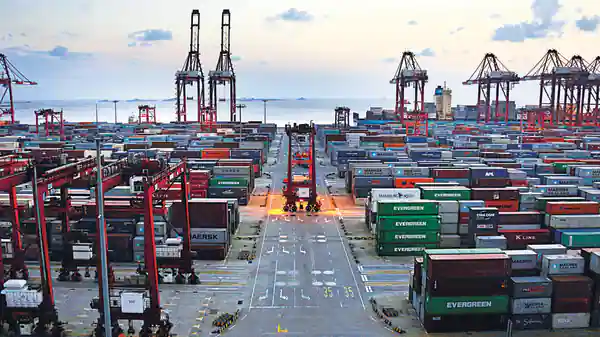Excess Inventory And Closeouts Build Up As China Slows Down.

China’s economy is projected to slow in 2022. After a strong start in early 2022, the largest COVID-19 wave in two years has disrupted China’s growth normalization. We project real GDP growth to slow sharply to 4.3 percent in 2022 – 0.8 percentage points lower than projected in the December China Economic Update. Closeout websites and closeout liquidators in the U.S. Are flourishing as importers and wholesalers need to get rid of dead stock sitting in their warehouses. The huge surge of goods that came into the country due to the pandemic has lead to large overstock inventory positions and in come cases it has even closed businesses. This downward revision largely reflects the economic damage caused by Omicron outbreaks and the prolonged lockdowns in parts of China from March to May. Growth momentum is expected to rebound in the second half of 2022, helped by aggressive policy stimulus to mitigate the economic downturn. Liquidation inventory and obsolete stock which was in short supply at the beginning of Covid is now available again in large size inventories.
In the short term, China faces the dual challenge of balancing COVID-19 mitigation with supporting economic growth. The government has stepped up macroeconomic policy easing with large public spending, tax rebates, policy rate cuts, and a more dovish stance on the property sector. While China has the macroeconomic space to counter the growth slowdown, the dilemma facing decision-makers is how to make the policy stimulus effective, as long as mobility restrictions persist. The U.S. Still relies heavily on China for a steady supply of cheap discount goods to fill dollar stores and big box closeout retail stores. Closeout websites, discount stores, liquidation inventory buyers and excess inventory buyers rely heavily on China's exports. In many cases businesses do not get rid of dead stock quickly enough, leading to slowing sales and even closed business. Recurrent COVID-19 outbreaks are adding to economic uncertainty, weighing on private investment and consumption and reducing the effectiveness of policy measures. There are now huge buildups of closeouts and liquidation inventory in China.
There is a danger that China remains tied to the old playbook of boosting growth through debt-financed infrastructure and real estate investment. Such a growth model is ultimately unsustainable and the indebtedness of many corporations and local governments is already too high. High debt levels lead to increased excess inventories that are no longer selling. This dead stock takes up valuable warehouse space and ties up room in factories. Closeout websites offer an alternate way to dispose of excess inventory quickly and often at full price. Closeout buyers that help businesses get rid of dead stock are another option, although they normally only pay pennies on the dollar. Instead, policymakers could shift more of the stimulus onto the balance sheet of the central government and direct public investment towards the greening of public infrastructure. Fiscal support could also target measures to encourage consumption directly, for example, through the wider use of consumption vouchers, discounts for inventory, and other alternative methods to get rid of dead stock from a closed business. This could lift consumer spending in the short term in locations where COVID-related restrictions have been lifted. Decisive action to encourage a shift toward consumption, tackle social inequality, and rekindle innovation and productivity growth—including in technologies vital for China’s dual carbon goals—would help achieve a more balanced, inclusive, and sustainable growth trajectory for China. Companies that specialize in helping businesses get rid of too much inventory are called closeout liquidators or excess inventory buyers. These companies can purchase entire inventories in one fell swoop, buying all of your closeouts at one time in a single transaction. They will take everything off your hands so you can either close your 3PL warehouse and get rid of all the inventory, or you can downsize you warehouse and offload your closeouts.
China’s economy, long in decline, is now in free fall—thanks to Chinese leader Xi Jinping’s mismanagement. Case in point: This year, the U.S. Economy is forecast to grow faster than China’s for the first time since 1976, with strong indications that China has entered a prolonged era of slow growth. More surprising is that Xi, in an attempt to stabilize China’s finances, has largely abandoned his ambitious plans to overhaul China’s growth model, choosing instead to double down on the very economic policies that got China into today’s economic bind in the first place. Put differently, Xi blinked. Excess inventory has piled up in factories and businesses are forced to sell inventory at a loss, just to get rid of dead stock and make room for new products. Sure, nobody wants to lose money getting rid of inventory, but sometimes the only option is to liquidate everything and start over.
Xi’s reversal speaks volumes. It suggests he lacks confidence in his own plan to transform China’s unsustainable economic model into one that can deliver on the Chinese Communist Party’s (CCP) promise of “high quality” growth. At one time China's economy was on fire and they could not keep up with production and imports. But today, with the pandemic wreaking havoc on many industries, exports are slowing and inactive and dead inventory is sitting in the warehouse. This cost money because cash flow is only generated when inventory is moving. Dead stock just takes up valuable warehouse space, especially if you have closeouts in a 3PL warehouse where they charge fees every month. Closeout buyers and inventory liquidators often clean out entire 3PL warehouses just so importers don't have to continue paying high storage fees. More important is that China’s fizzling economic miracle may soon undercut the CCP’s ability to wage a sustained struggle for geostrategic dominance.
China’s economic clout, beyond any other consideration, still serves as the foundation for the country’s vast influence. The gravitational pull of China’s market, along with Beijing’s ability to influence economic conditions and shape political perceptions in other countries, enabled China to bind itself to the world. But this is also thanks to huge demand from other countries for low priced closeouts and discounted inventory. If China couldn't produce and ship goods for less than other regions, they would not be the powerhouse they have become. The concern is what will happen to all the surplus inventory and excess inventory currently building up? Too much inventory in the warehouse is very costly and creates the need to liquidate inventory to closeout distributors. The fruits of China’s economic expansion also underwrote its power projection, covering the costs of the Belt and Road Initiative, military modernization, and expanding multilateral commitments. China’s GDP growth paid domestic dividends for the CCP too, empowering a model of state capitalism that broke down the barriers between the private sector and government institutions to mobilize the former in service of the latter.
Nevertheless, China’s meteoric rise, fueled by annual GDP growth above 6 percent, appears over. Yes, China’s economy has been cooling for years, plagued by systematic deficiencies like chronic over investment, massive debt loads, and a shrinking workforce, which has put enormous stresses on China’s finances. But these systematic trends have been exacerbated, perhaps irreversibly, by China’s disastrous pandemic response, where the lack of an effective domestic vaccine and the CCP’s unwillingness to approve and purchase Western ones have made rolling lockdowns a permanent way of life. So far, the CCP’s containment measures have resulted in plummeting industrial output, surging unemployment, capital flight, and a sinking currency. Liquidation merchandise is everywhere, whether it be from downsizing business having liquidation stock for sale, to closeout brokers selling bulk inventory.
Efforts to stabilize the Chinese economy will be further strained by a deteriorating external environment, with the World Bank warning of 1970s-style stagflation and reduced global demand for Chinese exports—until now, the engine of China’s growth. The economy remains severely dependent on vast supplies of imported fuel, grain, and other commodities whose prices have massively surged. Western technology transfer restrictions are also taking their toll. Selling off inventory has become more popular as buyers for inventory look for deals on excess stock and closeouts. The key to reducing excess inventory is good warehouse management, but in turbulent times like these there are many other factors including business bankruptcies, warehouse liquidations and liquidation of complete companies. Another challenge is growing frustration in China’s largest markets—the United States and the European Union—over Xi’s support for Russia’s invasion of Ukraine. Already, large multinational companies like Apple are shifting supply chains to Southeast Asia and other regions perceived as more stable while expatriates are abandoning the country and newly minted college graduates flee in droves. Indeed, China’s brain drain has begun. This may lead to more business closures, sales of liquidation inventory and excess merchandise for sale.
Merchandise USA specializes in buying closeout toys, housewares, overstock home décor and surplus inventory of lawn and garden products. We buy from everything from a business downsizing warehouses to shutting down it's 3PL warehouse or closing it's Amazon FBA seller account. Closeout inventory is always available for one reason or another, and we can handle any size overstock inventory.



